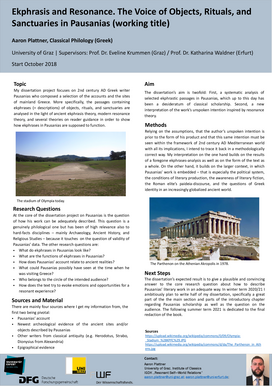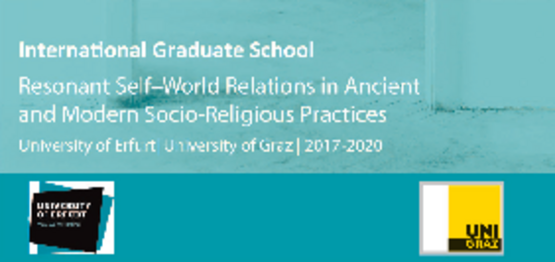Aaron Plattner
Resonance and ecphrasis. The voices of sacred spaces, rituals, and objects in Pausanias
In the light of resonance theory (Rosa 2016), the dissertation interprets literary reflections on the various self-world relationships in the ancient rituals described by Pausanias in his ten books Περιήγησις τῆς Ἑλλάδος (Engl. description of Greece). Its contribution to answering the pivotal question of the IGS is that it incorporates the view of an ancient observer into the research discussion.
At a time when Greece was ruled by Roman foreigners, and in the spiritual environment of the Second Sophistic, Pausanias, as part of the Greek world in the east of the Roman Empire, is particularly interested in "classical" Greece, especially in the religion of the archaic and classical period and its manifold substantial and ritual crystallizations. In an effort to revive this ancient and (not only in his eyes) glorious time, Pausanias textually depicts a selection of these crystallizations in numerous ecphraseis (i.e. descriptions) and thereby achieves a resonant charge of the text that becomes the resonance body, so to speak, for the public.
More specifically, the dissertation asks how Pausanias' ecphraseis of cults, ritual acts, festivals, sacred spaces, and sacred (art) objects create horizontal, diagonal, and vertical axes of resonance between subject and world - both in the narrative and in reality. The focus lies on the self-world relationships that are being reflected / negotiated in practices of direct and indirect perception (mainly seeing, but also reading and hearing) or not developed until in the course of this negotiation process.
According to the first phase of the IGS, the dissertation's objective is the provision of an inventory of different forms of self-world relations, that is an inventory of ritual ancient acts and of the relationships therein (to the fellow human beings: horizontal axis; to the objects: diagonal axis; and to the gods: vertical axis), as well as an inventory of practices that lead to contemplating the own self.
CV
Since October 2018
Doctoral programme at the Faculty of Humanities (subject Greek) within the framework of the International Research Training Group "Resonant Self-World Relations in Ancient and Modern Socio-Religious Practices" (Project partners: Center for Cultural and Social Sciences "Max Weber", University of Erfurt, University of Graz)
2010-2018
Graduation Latin and Greek at the University of Innsbruck (Diploma thesis: Hannibal's Assault on Saguntum in Silius Italicus. A Study of the Introductory Punica-Dyad also in the Light of Historiographical and Epic Traditions plus the Question of its Applicability to School Teaching in Austria)
Since February 2016
Bachelor programme CleO (Classica et Orientalia) with the core themes Ancient History and Classical Philology at the University of Innsbruck (interrupted due to the IGS)





